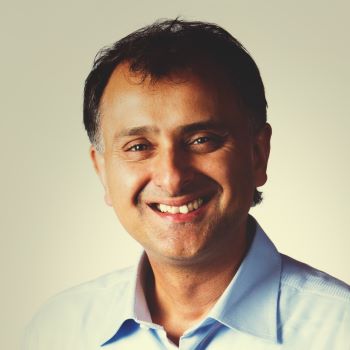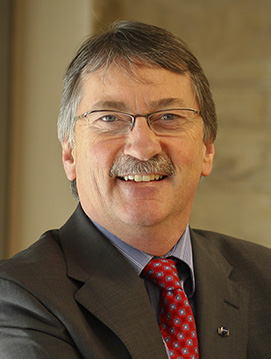Existential challenges make social sciences and humanities research increasingly vital
Social sciences and humanities research will become more important and vital as society grapples with global challenges such as artificial intelligence and climate change, social scientists told a Research Money webinar.
But for that to happen, federal granting agencies must adequately fund transdisciplinary social sciences-humanities research, policymakers must support the social sciences and humanities to the same level as the STEM sciences, and social sciences and humanities researchers must overcome their “unproductive” anti-business culture, panelists said.
 “We feel like the poor ugly cousin of the STEM subjects. We’re under-funded relative to them,” said Dr. Ajay Agrawal, PhD (photo at left), Geoffrey Taber Chair in Entrepreneurship and Innovation and professor of entrepreneurship at the University of Toronto’s Rotman School of Management, and founder of Creative Destruction Lab.
“We feel like the poor ugly cousin of the STEM subjects. We’re under-funded relative to them,” said Dr. Ajay Agrawal, PhD (photo at left), Geoffrey Taber Chair in Entrepreneurship and Innovation and professor of entrepreneurship at the University of Toronto’s Rotman School of Management, and founder of Creative Destruction Lab.
Yet when it comes to working with companies and industry, among social sciences and humanities researchers there is “an unproductive culture of being anti-business,” he told the November 7 webinar, “Stimulating Business Innovation: Changing Models for Greater Long-Term Success,” presented in partnership with the Social Sciences and Humanities Research Council (SSHRC).
“So why would we expect to be included in business if people [in social sciences and humanities] have a derogatory attitude?”
Also, many times social sciences and humanities researchers pick research questions that aren’t relevant to business and policymakers, Agrawal said.
 Dr. Tracey Lauriault, PhD (photo at right), associate professor of critical media and big data at Carleton University, described herself as a “critical data studies scholar” who does qualitative research about quantitative culture. She said her transdisciplinary work helps bridge the gap between social sciences and humanities and business, “but in many cases the work that I do is not valued by social science granting councils.”
Dr. Tracey Lauriault, PhD (photo at right), associate professor of critical media and big data at Carleton University, described herself as a “critical data studies scholar” who does qualitative research about quantitative culture. She said her transdisciplinary work helps bridge the gap between social sciences and humanities and business, “but in many cases the work that I do is not valued by social science granting councils.”
Research granting council adjudicators don’t rank highly proposed research on social theory and applied theory because it’s not considered new or innovative, Lauriault said.
Moreover, there are problems in how disciplines are organized and with research funding mechanisms, who adjudicates research proposals, and the nature of the research questions, she added.
For example, Lauriault said, it took her eight years to convince her university to let her teach a course on data science ethics in society. “It’s really difficult to do this work.”
 Hetan Shah (photo at right), chief executive of The British Academy (the national academy for humanities and social sciences), said the U.K’s economy is 80-per-cent in the services sector, but politicians don’t account for this in funding research programs.
Hetan Shah (photo at right), chief executive of The British Academy (the national academy for humanities and social sciences), said the U.K’s economy is 80-per-cent in the services sector, but politicians don’t account for this in funding research programs.
Social sciences and humanities research has an important role to play in areas such as economic analysis and future economic strategy, Shah said. However, a lot of R&D in social sciences and humanities tends to be under-counted and sometimes excluded under certain definitions of R&D, he noted.
We don’t know how to meaningfully measure innovation, where technology adoption – not just the commercialization of new technologies – is a critical issue, Shah said. “We’re not making the most of technologies we already have, let alone new tech.”
 Panel moderator Ted Hewitt (photo at left) president of the Social Sciences and Humanities Research Council of Canada, agreed with the panelists that society doesn’t measure all of the services that social sciences and humanities research provides to businesses, such as marketing.
Panel moderator Ted Hewitt (photo at left) president of the Social Sciences and Humanities Research Council of Canada, agreed with the panelists that society doesn’t measure all of the services that social sciences and humanities research provides to businesses, such as marketing.
In response to concerns about how research funding proposals are adjudicated and funding awarded, the federal tri-council funding agencies are experimenting with new models of that are different from the agencies’ standard funding programs, Hewitt said.
For example, the New Frontiers in Research Fund (NFRF) “provides a completely novel approach to project development, adjudication and implementation,” he said. “This is really a pilot for us to test ideas that can then be implemented in other programming.”
NFRF aims to support world-leading interdisciplinary, international, high-risk, high-reward, transformative and rapid-response Canadian-led research. Awarded projects receive between $2 million to $4 million per year for six years.
However, Hewitt noted, NFRF is currently funded at only $130 million per year and is less well known within the federal research granting program ecosystem.
In comparison, the federal Scientific Research and Experimental Development (SR&ED) program, which provides tax incentives aimed at encouraging businesses to conduct R&D in Canada, provides more than $3 billion per year.
Human judgment will become the most valuable resource
Agrawal said the need for and importance of social sciences and humanities research will grow, because existential technologies such as AI will require human judgment to assess, for example, which AI models will benefit versus harm humanity.
“The role of judgment will become increasingly important,” he said. “The most valuable resource in the AI economy will be [human] judgment.”
There’s going to be a renaissance in philosophy studies that are directly applicable to society and modern problems, Agrawal predicted. “We are going to have to rethink what it means to be human, in terms of what things are in the domain of machines versus humans.”
Shah, who earlier this month attended the international summit on artificial intelligence safety hosted by the U.K. at Bletchley Park, said AI needs participation by social sciences and humanities researchers “right from the start – to say what is it for, what are the values that we’re imbuing into the technology, or the biases we’ve contained within it.”
Participation by social sciences and humanities researchers can help maintain the social license for AI, unlike, for example, genetically modified foods in Europe where this scientific technology wasn’t taken forward because the social license was lost, Shah said. “We need to maintain trustworthy technology.”
Lauriault said she’s working with a transdisciplinary group at the University of British Columbia on a SSHRC-funded project called “I Trust AI” that’s looking at the extensive challenges in developing AI models, including the “anglo-centricity” and use of English, to the exclusion of other languages and cultures.
There are more than 2,700 languages in Africa and most AI models and systems don’t recognize them, she said.
Society’s biggest challenges require transdisciplinary research, she added “To me it’s always about how can we build tools that are in the public interest, that are for the public good, that can help us actually create more sustainable and fair societies – and what’s the role of the social sciences in doing that.”
Counterbalance needed to over-emphasis on STEM skills
Lauriault is working on another project – funded by Natural Resources Canada – with Montreal-based Open North to develop an “open smart cities model” (which includes open data) that would provide benefits to communities.
Open North, a nonprofit organization, includes a diverse group of analysts, researchers, operational planners and others. The organization is dedicated to advancing the common good by creating and implementing practical solutions through transformative digital strategies and data governance frameworks.
OpenNorth is also involved in Infrastructure Canada’s $300-million Smart Cities Challenge, a project led by Toronto-based Evergreen, a national non-profit working with city planners to facilitate low-carbon and inclusive solutions. The Smart Cities Challenge empowers communities to adopt a smart cities approach to improve the lives of their residents through innovation, data and connected technology.
Leaving the creation of smart cities to corporations will result in them keeping data behind closed doors and building smart city systems in the absence of science, Lauriault said. For example, Sidewalks Labs’ proposed Sidewalk Labs smart city concept for Toronto’s eastern waterfront would have created a giant surveillance apparatus, she added.
Sidewalk Labs abandoned the project in 2020 in the wake of criticism from residents and privacy advocates and due in part to economic uncertainty in the wake of the COVID-19 pandemic.
There is almost no regulation in Canada of data brokers (companies that profit from the exploitation of personal data) and no accessible databases on data procurement, including procurement by government, Lauriault noted.
On the positive side, Indigenous data governance in North America is now coming to the forefront, Lauriault said. “We’re seeing a lot more support for Indigenous data sovereignty,” along with Indigenous consultant firms on data and technology and Indigenous-led data and cloud computing centres often located in northern Canada and remote communities. Social sciences R&D played an important role in informing and guiding such initiatives, she said.
Haten said the British Academy launched an initiative called “Social Sciences and Arts for People in the Economy” (SHAPE) as a counterpart to the “over-indexing” in skills development on the STEM (science, technology, engineering, math) area, and the focus on business clusters rather than the creative economy sector. SHAPE was developed to tell the story of social sciences and arts subjects, “which help us makes sense of the human world, to value and express the complexity of life and culture, and to understand and solve global issues,” according to the SHAPE website.
The British Academy also has established innovation fellowships that enable some of the academy’s funded researchers to work with businesses or policymakers, and is looking at creating “venture fellowships” for humanities and social sciences researchers to launch and run new businesses.
“We’ve got to start at the narrative level” in addressing the need for social sciences and humanities research, Haten said. “If people have imbibed the notion that technology is the thing that will answer the problems that we’ve got, that’s not a helpful narrative,” he said.
“Whereas if we can show that the social judgment, the creative [industries] are the things that we need to place a premium on, then we will design our systems differently.”
This webinar is available here on Research Money's YouTube channel.
R$
Events For Leaders in
Science, Tech, Innovation, and Policy
Discuss and learn from those in the know at our virtual and in-person events.
See Upcoming Events
You have 0 free articles remaining.
Don't miss out - start your free trial today.
Start your FREE trial Already a member? Log in
By using this website, you agree to our use of cookies. We use cookies to provide you with a great experience and to help our website run effectively in accordance with our Privacy Policy and Terms of Service.





